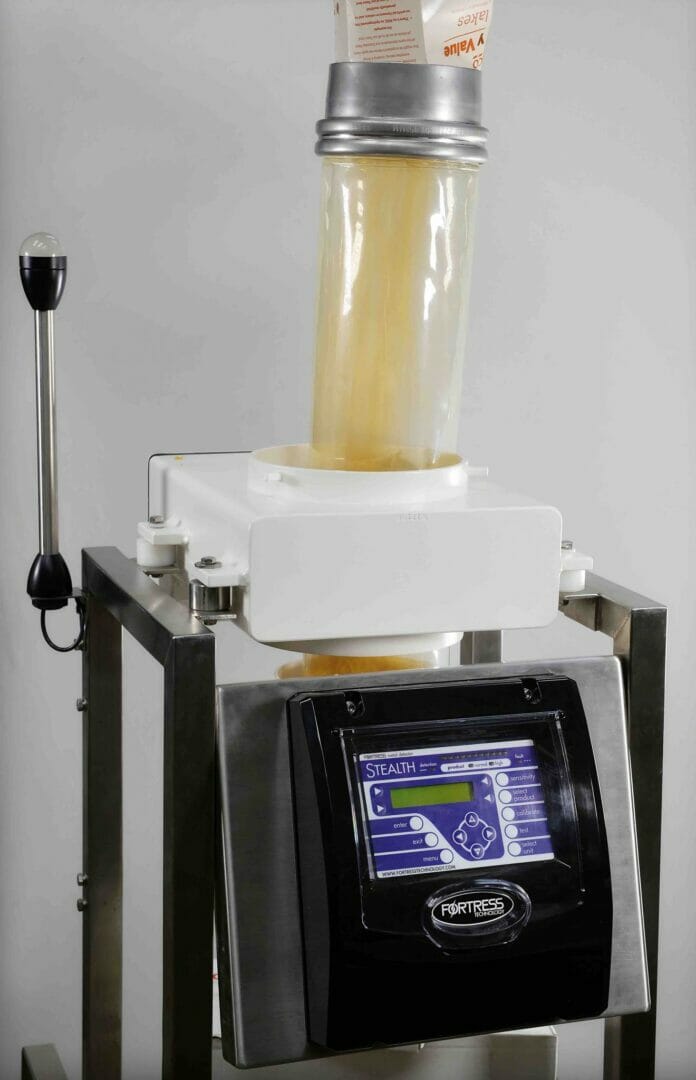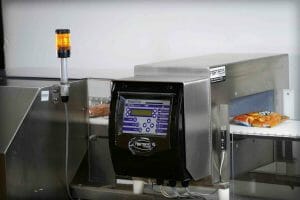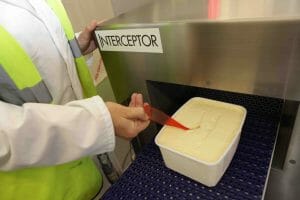For SME food factories investing in entry-level inspection equipment, the biggest nemesis has long been ‘you get what you pay for’. Well no more.
Metal detector specialist Fortress Technology has just re-launched its flagship entry-level Phantom model. Now, when future production requirements and retailer codes of practice demands it, a Phantom unit, can be upgraded to include the data capture specifications in the company’s Stealth model.
Aimed squarely at new food manufacturers, SMEs and companies in emerging markets, the Phantom range offers robust metal detection functionality and Quality Assurance in a fit-for-purpose, reliable way that Fortress is renowned globally for. By rationalising some of the technology options previously available, Phantom users pay for the features they need to satisfy local and international food safety standards at a price point that suits their budget.
Yet, by sticking to a universal modular design and introducing a common membrane panel, all customers benefit from being able to upgrade to a Stealth level of performance to meet the most stringent UK retailer codes of practice when it’s demanded.
Suitable for inspecting bakery, meat, dairy, confectionery, fresh, ambient, chilled and frozen food, healthcare and packaged products including any items with aluminium foil packaging, the Phantom can be installed in a conveyor, gravity, pipeline, bulk or laboratory configuration.
For many longstanding Fortress customers, the functionality of the Phantom has ticked every box. And although upgrades to existing operating systems were available for the lifetime of the machine, this is the first time Fortress has offered customers the option to add features from another model.
The basis for this product rationalisation, explains Phil Brown, managing director of Fortress Technology Europe is the sheer volume of food SMEs within the European marketplace and the focus on improving food safety in emerging economies. “This new development in our range has been market and customer driven,” he emphasises.
“Last year, over 60% of our UK machine orders were installed by SME companies with fewer than 250 employees. Equally, there’s plenty of entrepreneurship in emerging economies and food markets, such as India and Turkey. However, in many of these markets, food safety and inspection reforms are still at the fledgling stage.”
Even if inspecting for metal contaminants isn’t a retailer requirement now, food SMEs that start to institute systems at the early stage will be ready to expand and meet the demands of the more stringent retailer Codes of Practice when their product range takes off, suggests Phil.
Likening the new Phantom to purchasing a high performance vehicle such as a BMW series, and then being able to add Maclaren P1 supercar performance, Phil continues: “By maintaining the universal simplicity of the unit and introducing symbols on the control panel we are catering to much wider international markets and food factories where English might not be an operatives’ first language.”
Realistically, with the right maintenance, a well-built metal detector like the Phantom can run for 20+ years. Good news for companies seeking longevity in their inspection equipment. And even better for the environment as it doesn’t mean replacing perfectly functional kit with new because it doesn’t comply with the latest retail inspection standards or regulations.
Spare parts continue to fit all, which is a major benefit when cost of ownership is high on the agenda for food companies reliant on machine uptime to fulfil customer orders.
During this rationalisation exercise, Fortress has invested significant R&D into its three core metal detectors. For close to two decades the Phantom has and remains been an excellent food inspection metal detector, with Stealth evolving into the mainstay model for factories requiring advanced technology features like retailer COP compliance, data capture and single pass product learning. The Stealth unit can also be customised quite extensively to suit specific customer applications, for example a throat metal detector used widely by the snacks industry, or into a multi-lane system. Top of the range is the Interceptor, designed to overcome product effect and deliver increased metal detection sensitivity when inspecting wet or conductive products and reduce the volume of good food being wasted due to false product rejects.
“Our Never Obsolete promise continues to apply right across our range,” assures Phil. “This ability to upgrade goes a long way to boosting overall equipment effectiveness and providing quality assurance for food processors and manufacturers, as well as safeguarding consumers.”










